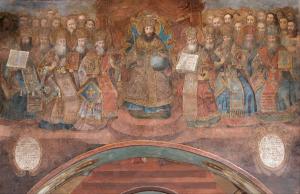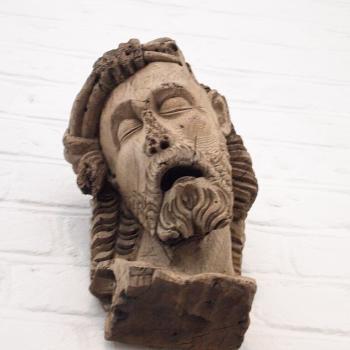
It might seem strange that the last Sunday of the Byzantine Paschal cycle, coming after the Ascension, focuses on the Fathers of the First Ecumenical Council, that is, the Fathers of I Nicea. And yet, if one reflects upon the way the Father glorifies Jesus through his resurrection, then the relationship becomes more apparent: the Council of Nicea, in affirming the divinity of Jesus, affirms the glorification which the Father gives to the Son, the glorification which is given to the Son because he is the Son of the Father, God from God, light from light, true God of true God. After the ascension of the Son comes the response to that ascension: the recognition of the glory of the Son, a recognition which was implicit within the Christian faith from the beginning. It is not that the recognition of the divinity of the Son came from Nicea: it was believed, but the theological implications of that belief took centuries of examination and discussion before it could be given proper nuance, a nuance which was given at Nicea.
The Son glorifies the Father, the Father glorifies the Son. They do so in all eternity. The glory of the Son is an eternal glory, the glory of divinity itself. The glory of the Father is likewise an eternal glory, the glory of the divinity itself. It is one glory, one divinity, and yet we have the Father and the Son, two persons of the Trinity, the Father who eternally begets the Son, and the Son who is eternally generated by the Father. They love each other, and in that love, they personally glorify each other. But that glory is not just the glory of the immanent Trinity, it is also the glory which is revealed to us in the economic Trinity, in the way the Trinity works with and reveals itself to the whole of creation. The glory by which the Son glorifies the Father in all eternity is revealed in history in an economic form, in the way the Son assumed human nature, emptied himself of the divine glory in his humanity, and lived his earthly life as a life of loving service to the Father (which included, as all such service does, love and respect for creation itself). It is in this manner St. John Chrysostom explained the glory which he receives from the Father comes, in part, from his own loving service to humanity and the love and service which comes from it:
Well said He, “on the earth”; for in heaven He had been already glorified, having His own natural glory, and being worshipped by the Angels. Christ then speaks not of that glory which is bound up with His Essence, (for that glory, though none glorify Him, He ever possesses in its fullness,) but of that which comes from the service of men.[1]
The Son, of course, always is God, but in the economy of the incarnation, in his humanity, he is perfectly human and so represents in his human form the way he glorifies the Father, which is why we can and must say it is revealed through his self-giving love to the Father, a love which has him give all of himself to the Father by way of the cross. Likewise, then the Father with his eternal love for his only begotten Son, likewise loves the incarnate Son, and therefore loves his assumed human nature.
The Father begets the Son in eternity: the Son’s glory is, in a mysterious way, connected to that eternal begetting; but the manifestation of that glory, revealed to us in the divine economy towards us, is in the glorification of the incarnate Son through his resurrection from the dead. There, the Father glorifies the Son in showing to us the firm, complete approval and love he has for the Son, the revelation that Jesus was who he said he was, the Son of God who is also God.
Thus, in words the Word of God, Jesus, spoke preparation for his death and resurrection, we read:
When Jesus had spoken these words, he lifted up his eyes to heaven and said, “Father, the hour has come; glorify thy Son that the Son may glorify thee, since thou hast given him power over all flesh, to give eternal life to all whom thou hast given him. And this is eternal life, that they know thee the only true God, and Jesus Christ whom thou hast sent. I glorified thee on earth, having accomplished the work which thou gavest me to do; and now, Father, glorify thou me in thy own presence with the glory which I had with thee before the world was made” (Jn. 17:1-5 RSV).
The glory which Jesus had with the Father, a glory which he had from eternity as the Word of God, is the glory which is manifested in the resurrection of Jesus. He has given all to the Father; the Father has given all to him. Only God can give all to God, for only God can receive all that is God. This is what we see in the glorification of Jesus in his resurrection from the dead: the mutual self-giving of the Son to the Father and the Father to the Son, but in the resurrection, we see this manifested in an economic form.
The Council of Nicea represents one of the ways the church glorifies the Son, giving loving service to him. For just as Jesus is glorified in the resurrection, he is also glorified in the preaching of the resurrection, following what St. Augustine declared: “But God is first of all glorified here, while He is being made known to men by word of mouth, and preached through the faith of believers.”[2] That means, he is glorified in the presentation of who he is, the Son of God. The Council of Nicea, in its affirmation of the divinity of Jesus, affirms the Father’s glorification of the Son by glorifying the Son himself. It fulfills the process of that glorification because it represents the acceptance of that glorification: those who deny the divinity of Jesus deny his eternal glory, and therefore, deny the Father glorifying the Son in the resurrection. This, then, is what connects Nicea to the Paschal celebration, and why the celebration and commemoration of the council is a fitting way to end the Paschal cycle. Nicea is the human reflection and representation of the that glory, the fitting response to that glory. Like the Apostle Thomas, the church says, “My Lord and My God.”
The resurrection glorifies the Son on earth, showing revealing his divinity to all. The church glorifies the Son on earth, giving him the fit and proper response due to the glory shown in his resurrection. We must remember, of course, that the glory which is his, the glory which he has in eternity, was never lost to him. Even if the church did not properly respond to that glory and declare it, it was and would still be his. In heaven he is glorified for all eternity; it was, however, for us that he revealed that glory in a way for us to ascertain it, so that we came not only to know it, but to love it and love him for it. He did not come as a powerful tyrant forcing us to render him glory. He came out of love, sent to us from the Father out of love, willingly died for us out of love, and is received by the Father and glorified out of that love. The response which we give to him should come both through our intellectual apprehension of his glory but also out of the love which he generated in and through us by his own love towards us.
The glory, then, which Christ spoke, the glory which he was to receive on earth, the glory which was recognized by Nicea, came as a result of his living out of that glory and revealing it to us as being the glory of love through his divine service for us. God loves the world, and through that love, renders his blessings to us, sharing his glory with us. By affirming Jesus’ divinity, we affirm God shares his glory with us.
This, then, was what was declared by Nicea, and it was a declaration not created ex nihilo by the Fathers of the Council, but as a continuation of the teaching of the faith handed down since the time of the Apostles. The theological expression which developed and used at Nicea came as a result of the questions which were raised about the meaning of Jesus’ divinity: the affirmation, then, must not be seen as creating a new teaching but only an elucidation of the teaching of the truth given by Jesus and affirmed by the Father in the resurrection of Jesus.[3] The Father is glorified in the Son, the Son in the Father, and the Christian faith proclaims that glory through its proclamation of faith, the Nicene Creed, a fit and proper human expression which affirms the meaning of the resurrection itself.
[1] St. John Chrysostom, “Homily LXXX on St. John” in NPNF1(14): 297.
[2] St. Augustine, “Tractates on the Gospel of St. John” in NPNF1(7): 396 [Tractate CV].
[3] “As to the Nicene Council, it was not a common meeting, but convened upon a pressing necessity, and for a reasonable object. The Syrians, Cilicians, and Mesopotamians, were out of order in celebrating the Feast, and kept Easter with the Jews ; on the other hand, the Arian heresy had risen up against the Catholic Church, and found supporters in Eusebius and his fellows, who were both zealous for the heresy, and conducted the attack upon religious people. This gave occasion for an Ecumenical Council, that the feast might be everywhere celebrated on one day, and that the heresy which was springing up might be anathematized. It took place then; and the Syrians submitted, and the Fathers pronounced the Arian heresy to be the forerunner of Antichrist, and drew up a suitable formula against it. And yet in this, many as they are, they ventured on nothing like the proceedings of these three or four men. Without pre-fixing Consulate, month, and day, they wrote concerning Easter, ‘It seemed good as follows,’ for it did then seem good that there should be a general compliance; but about the faith they wrote not, ‘It seemed good,’ but, ‘Thus believes the Catholic Church;’ and thereupon they confessed how they believed, in order to show that their own sentiments were not novel, but Apostolical; and what they wrote down was no discovery of theirs, but is the same as was taught by the Apostles,” St. Athanasius, “De Synodis” in NPNF2(4):452-3.
Stay in touch! Like A Little Bit of Nothing on Facebook.
If you have liked what you read, please consider sharing it with your friends and family!













